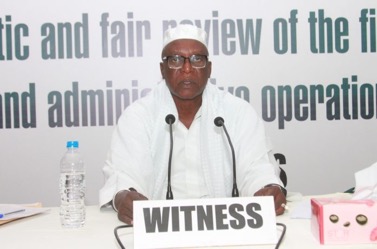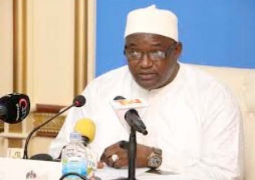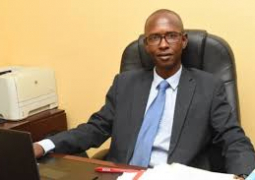
Mr Leigh is serving in the top office at the council for the second time after his first spell (2016-2021). He had already acknowledged acts and practices under his tenure that contradicted the legal regulations and policies guiding local governance.
The testimony yesterday took another dramatic turn when Counsel Patrick Gomez began the day’s session with questions regarding the National Audit Office Report for JAC (1st December 2019 to 31st December 2020)
The counsel referred Mr Leigh to page 12 of the NAO report, which delved into JAC’s revenue and expenditure for the year ended 31st December 2019.
The Commission came to realise that there was a difference between the revenue earned by the council. In 2018, the council earned over 10.8 million dalasis in 2018 and earned over 12.5 million in 2019, as per evidence before the Commission’s desk. The witness acknowledged the figures as correct.
Reacting to the counsel’s question over how the council arrived at the amount for 2019, the witness testified that every year, they used to increase their rates. “For example, now if you pay D3,000 in a year, the following year we will charge you more than D3,000 dalasis,” he said
“But how do you come up with that decision?” Counsel Gomez asked.
Leigh explained that the decision was reached by the management. “The CEO and the team,” he said, responding to the question regarding who the management were.
As put forth by Counsel Gomez, he affirmed that this explained the “difference between the 10 million and 12 million dalasis”.
“I am asking,” Counsel Gomez said, “because you have said that most of your financial statements were not accepted by the auditors. That explains why the auditors would issue out a disclaimer. If you look at the audit report, it always gives reasons as to why the auditors wouldn’t accept financial statement for the year. If you turn to page seven, you will see there a disclaimer of opinion with respect to the financial statement.
Gomez added: “It shows you, just for the introductory part, as to why there was a disclaimer. By the way, a disclaimer would be, in audit terms, that the situation on the ground with respect to what you have submitted for your financial statement is so much insufficient that they cannot have a provisional opinion. Do you understand what I am saying?
Witness Leigh asked where the counsel was reading, and the former responded: “Page seven. What the auditor is saying here is that what you have presented as being the true reflection of your financial statement does not contain anything apart from expenditure and income.
“Just that, no further explanation. I would read for you. It says: ‘We have audited the financial statement of Janjangbureh Area Council for the Year ended 31st December 2019. The financial statement comprise of revenue and expenditure statement for the year ended and a summary of accounting policies and other explanatory information on page 12 to 21.’
The auditors, according to citations from the report by Counsel Gomez were not able to obtain “sufficient and appropriate audit evidence to provide basis for an audit opinion”.
In a wistful tone, the top counsel uttered: “So all in all, what you basically do is that you just presented to the auditors figures for income and expenditure.
The witness acknowledged the counsel’s conclusion and couldn’t provide a statisfying answer with regard to why this happened.




